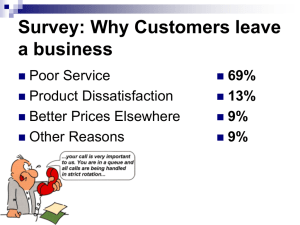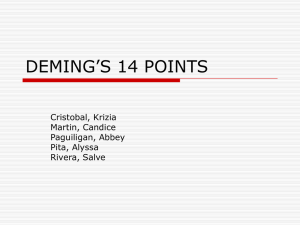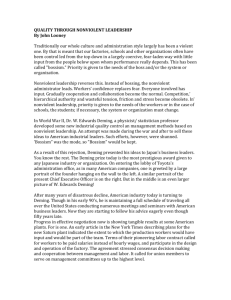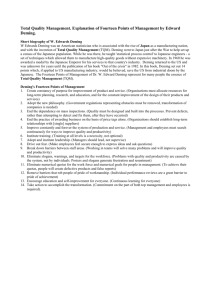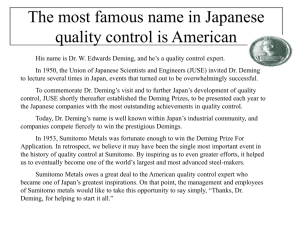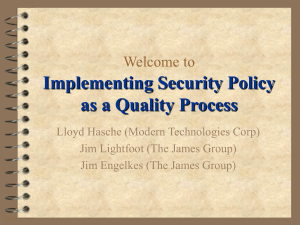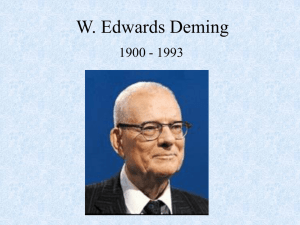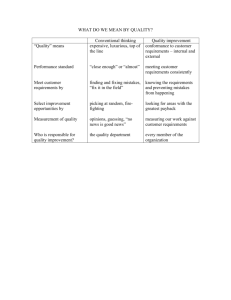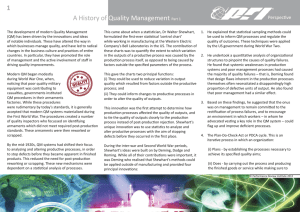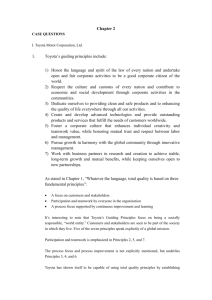Add Title Here - Institute of Industrial Engineers
advertisement
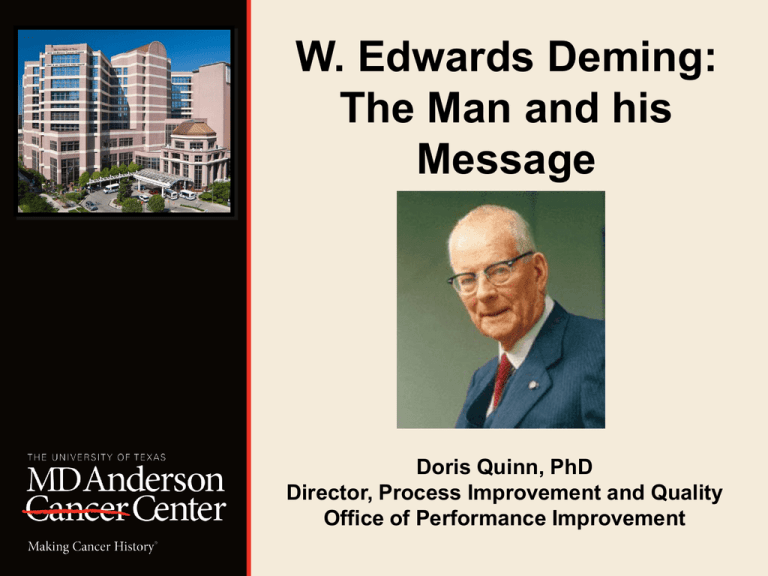
W. Edwards Deming: The Man and his Message Doris Quinn, PhD Director, Process Improvement and Quality Office of Performance Improvement Objectives: At the end of this session, learners will: 1. Have an appreciation for the kindness and generosity of Dr. Deming 2. Understand why Dr. Deming’s teachings are still relevant in today’s economic situation 3. Appreciate the value of his “Profound Knowledge for quality improvement today. Why are we here? • Dr. Deming’s question at the start of every 4-day seminar. • TO HAVE FUN!! • Our job is to make things better, not compete against each other. He received the “Second Order Medal of the Sacred Treasure” in 1960 from the Emperor of Japan Dr. Deming discovered! If Japan can... Why can't we? • Was an American television episode broadcast by NBC News as part of the television show "NBC White Paper" on June 24th, 1980, credited with beginning the Quality Revolution and introducing the methods of W. Edwards Deming to American managers (producer: Clare Crawford-Mason, reporter: Lloyd Dobyns) Claire Crawford-Mason 1982: Diary of my first trip My first trip was to meet him at his little flat in New York City. The next morning we were to fly to California for a consultation session with Nashua Paper. After Dr. Deming fell asleep, I wrote these reflections of my first encounter with the great master……(readings from my personal files) The Man Qualities of Dr. Deming: • Generous • Humble • Kind • Driven Generous • All proceedings made from the sale of books and his lectures in Japan were returned to JUSE. • I found countless notes in his office of donations, gifts, and tuitions paid with a frequent note that he remain anonymous. • Often mentored doctoral students even though he had so little time for himself. Humble • ALWAYS gave attribution to those who’s ideas he used (even when he didn’t know the name). • Wrote music and was so thrilled when St. Paul Church and Rivier College performed his Mass to the Holy Ghost. • His home was very humble and his office in the basement was good enough! Picture of his basement office His piano and ongoing music he was writing Kind • When he worked with auto industry, he always started by interviewing workers, then supervisors, managers and evening with Senior leaders. He always championed the cause of the workers who often didn’t have the proper training or support for improvement. • Once he was particular terse with a worker because she didn’t understand variation. Later that night, he wrote a letter of apology—it wasn’t her fault, she hadn’t been taught. Driven • My last trip with him September, 1993 (he died December, 1993) From his hospital bed, to California and why he HAD to go…(readings from my personal files). The Message Profound Knowledge 1. 2. 3. 4. Appreciation for a system Knowledge about variation Theory of Knowledge Psychology 1993 Notes to Managers The New Economics “This book is for people who are living under the tyranny of the prevailing style of management. The huge, long-range losses caused by this style of management have led us into decline. …the present style of management is a modern invention…Preface, p. xi Appreciation for a system • Definition: – A system is a network of interdependent components that work together to try to accomplish the aim of the system. • It is the responsibility of leaders to determine the aim. • We must optimize the whole system even if it means sub-optimizing parts of the system. • Deming was probably the first to describe “Production viewed as a system” p. 60 Appreciation for a system • Definition: – A system is a network of interdependent components that work together to try to accomplish the aim of the system. • It is the responsibility of leaders to determine the aim. • We must optimize the whole system even if it means sub-optimizing parts of the system. • Deming was probably the first to describe “Production viewed as a system” p. 60 This is an organization chart! Joy in Work!! (Deming) React to these statements: • Goals can often lead to demoralized employees • If you reward an individual for achieving numerical goals, you will ruin the department/company. • Performance appraisal are the worst thing we do to employees. Knowledge about variation • “When I went to Western Electric Co in 1925, people there were already talking about Dr. Shewhart at the Bell Telephone Laboratories.” p. 176 • Common causes and special causes of variation, know the difference and take appropriate action. • He devotes a chapter to the Funnel Experiment. Psychology • Management of people – “We must throw overboard the idea that competition is a necessary way of life. In place of competition, we need cooperation.” p. 124 • Role of a Manager of People – “This is the new role of a manger of people after the transformation.” p. 128 – The Red Bead Game provides all the lessons of what NOT to do as a manager. Psychology • “Psychology helps us to understand people, interaction between people and circumstances, interaction between customer and supplier, interaction between teacher and pupil, interactions between a manager and his/her people and any system of management.” p. 110 • What truly motivates employees? • How do we manage people during periods of change? Theory of Knowledge • “Without theory there is no knowledge” • Theory of knowledge teaches us that a statement, if it conveys knowledge, predicts future outcomes, with risks of being wrong, and that it fits without failure observations of the past. • The fallacy of cause and effect without data. • Information is not knowledge QI in Healthcare • Dr. Paul Batalden began writing about quality in healthcare in 1977. • Dr. Don Berwick also involved in quality improvement. • The two team up and Institute for Healthcare Improvement (IHI.org) is born. Kenney, C. (2008), The Best Practice: How the new quality movement is transforming medicine. Notes on Management in a Hospital • Excerpts from Dr. Deming’s paper 20 Sept. 1989.
